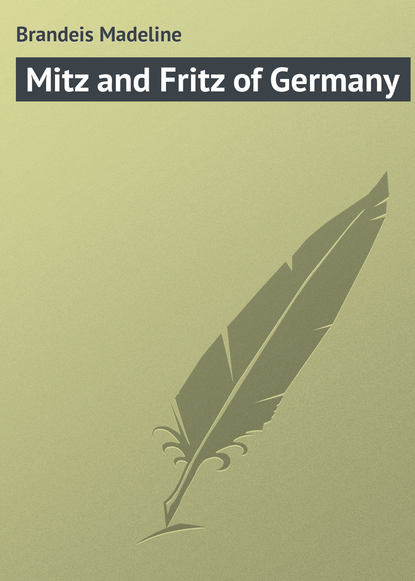По всем вопросам обращайтесь на: info@litportal.ru
(©) 2003-2024.
✖
Mitz and Fritz of Germany
Настройки чтения
Размер шрифта
Высота строк
Поля
"Yes," laughed Mrs. Toymaker. "I have no doubt of that. For you are always hungry and you can always talk! But, you see, Richard was different."
"A bit foolish, like Fritz," said Mitzi knowingly.
The mother paid no attention to this remark but went on with her story: "The people in the coach were kind and threw money to Richard. He and his friend had a good dinner and finally reached Prague. But they say that he never forgot this experience."
A light began to shine in Mitzi's eyes as her mother finished the tale. An idea had been born in her busy little head. That evening after supper she took Fritz by the hand.
"Come," she whispered. "I have something to tell you – something very exciting." She led him away from their wagon, out upon the moonlit road. "Fritz," she said, "I have thought of a way to help Father. I thought of it after Mother told that story about Richard Wagner. Now, if Richard had been a boy musician like you, he might have played for people and – "
"Do you mean that he might have played on his trip to Prague?" asked Fritz.
"Yes," said Mitzi. "In every town. The people would have thrown him so much money that he could have bought all the bread and sausage and – "
Fritz laughed at Mitzi's wide eyes.
"Well, but what has that to do with our helping Father?" he asked.
"Don't you see?" she replied. "You shall play on the streets, and people will throw coins. Then, even if Father cannot sell toys, we shall still have money with which to buy food."
"Oh, Mitz!" said Fritz.
"Oh, whist!" cried Mitzi impatiently. "I am going to make you do it! You'll see how easy it will be."
"But Father will not let me do it," said Fritz. "He does not like my fiddling. He would punish me."
"We won't tell him," said Mitzi. "He only forbade you to play when he puts you to work. Other times, it is not wrong for you to do it. So, when Father is selling toys in the next market place, we'll run off. You shall play your violin, and pretty soon crowds of people will gather and – "
"Oh, Mi – " began Fritz.
"Oh, fiddlesticks!" snapped Mitzi. She took him firmly by the arm. "Come," she said. "It is all settled. It is a fine plan. So now let us find something to eat and then go to bed."
CHAPTER V
ALONG THE ROAD
Mr. Toymaker heard of a fair to be held in Mainz (Mīnts). So he decided to go there at once, although it was some distance from Bayreuth.
On the journey the children were kept busy. Fritz had to help his father with many things. Mitzi had to help her mother. They found no time to try their plan. But they did not forget it.
Along the road they saw much of interest. They passed small hotels for young travelers hiking about the country. In different lands there are different sports. Spain has her bullfights. England has her cricket. Switzerland's high mountains are popular for snow and ice sports. The United States plays baseball. But Germany hikes.
All over the land, in the summer time and even in winter, one meets groups of walkers. Children walk with teachers. Older children walk alone. As they walk they sing. They admire their country and learn. They stop overnight in these little youth inns – hotels made especially for boys and girls.
"Some day I am going with a group," said Mitzi. "I am going on hiking trips."
"Not until you are a bachfisch (bäk´fish)," said Fritz.
In Germany a young girl is called a "bachfisch," which means "baked fish."
But not so long ago in Germany girls did not hike and swim and play tennis. But now it is different. Girls are interested in everything, just as they are in America.
The Toymaker family journeyed through Hanau (Hä´nou), home of the Grimm brothers. The children spoke of these two devoted men, who had always worked together. Some of their stories have become famous, as, for instance, "Hansel and Gretel" and "Tom Thumb."
The family moved on toward Frankfurt.
The five Rothschild brothers had lived in Frankfurt. They had become the richest men in Europe and were called "The Five Frankfurters." Mrs. Toymaker remembered that the great poet, Goethe, had been born there.
Mitzi hoped to eat her fill of sausages. Frankfurt is supposed to be the home of the "hot dog." But she had more important hopes than eating "hot dogs." She was going to carry out her plan for Fritz's concert when they reached Mainz.
CHAPTER VI
MAINZ AND A BEGGAR
"Come quickly, Fritz. Now, we can slip away!" said Mitzi.
They were in the market place of Mainz. Their father was sitting at a booth under a striped umbrella. He was selling a few toys, and he looked more cheerful than usual.
Mitzi led her brother down the street.
"Quickly, come! We shall stand here before this big church," she said.
They had stopped in front of a beautiful old cathedral. Near by stood the statue of a man holding a sheet of paper in his hands.
"That is the statue of Gutenberg (Go͞o´tĕn-bĕrk), the inventor of printing," said Mitzi.
Fritz could not help thinking, just then, of all the great men who have come out of Germany. There was this Gutenberg, born here in Mainz. There was Professor Einstein (Īn´stīn), the famous scientist, born in Ulm. There was —
"Fritz! Fritz!" His sister was stamping her foot and screaming until she was almost purple in the face. "Will you listen?" she cried. "What are you thinking of? Come now! Stop dreaming and play your violin!"
Fritz had to laugh at her stern round face and her sharp command.
He saluted and said, "Yes, yes, General! I obey."
Then he took up his violin and began to play. Several people stopped to listen. They smiled but passed on. Mitzi stood on one foot and then on the other. Frank lay at her feet, wondering why they did not go on to explore this strange new city. Fritz played and Mitz stood, and only a few people seemed to notice them. Among these was a gentleman who put his hand into his pocket.
"Catch!" he said to Mitzi, as he threw her a coin.
After some time, Fritz grew tired and Mitzi discouraged.
"Let us go and buy sausage with this coin," said Mitzi.
She was not altogether pleased with the way things had worked out. But, anyway, she wanted to surprise her father with the small bit they had been able to make.
They turned to leave, when all at once they heard a whining sound behind them. They looked around. Sitting upon the church steps was a beggar. He wore ragged clothes and was a very old man. He held out his hand to Mitz and Fritz.
He said, "I am a beggar and I am hungry. Will you give me your coin?"
He looked miserable. Mitzi felt sorry for him. But still she thought of her father's pleasure if she should return home with sausages.










